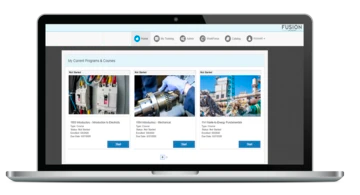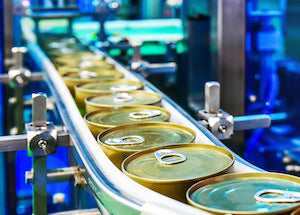Covers the effects of gain, bandwidth, and distortion on amplifier performance. The course compares linear and nonlinear (switching) amplifiers. Explains how to use transistor curves to analyze amplifier operation in terms of operating regions, load lines, operating (Q) points, and biasing. The online course discusses impedance matching and compares capacitive, transformer, and direct-coupled amplifiers. Describes many ways op-amps are used today, including integrators and comparators. Provides specific methods for troubleshooting common amplifier problems that maintenance technicians should be familiar with when working with electronics. This course has no prerequisites. Amplifiers is available in online maintenance training and course manual formats.
Lesson 1 - Introduction to Amplifiers
Topics:
Amplifying circuits; Amplifier characteristics; Transistor amplifiers; Characteristic curves; Effects of temperature
Learning Objectives:
– Explain how gain, bandwidth, and distortion relate to amplifier operation.
– Compare bipolar transistor amplifiers and FET amplifiers.
– Explain how to use characteristic curves to predict transistor performance.
– Explain how to use an input/output curve to determine transistor gain.
– Discuss the effect of ambient temperature on amplifier performance.
– Discuss the uses of operational amplifiers and switching amplifiers.
Lesson 2 - Single-Stage Amplifiers
Topics:
Biasing circuits; Operating points and load lines; Biasing common-emitter, -collector, and -base circuits; Biasing FET amplifiers; Amplifier classifications; Push-pull amplifiers
Learning Objectives:
– Discuss the transistor characteristics that define operating region limits.
– Explain how to draw an amplifier load line.
– Explain how to find the operating point of an amplifier.
– Discuss biasing as a means of establishing a stable operating point in an amplifier circuit.
– Discuss five ways that amplifiers can be classified and compare Class A, AB, B, and C amplifiers.
Lesson 3 - Amplifier Performance and Multistage Amplifiers
Topics:
Power, current, and voltage gain; Distortion; Impedance matching; Multistage amplifiers; Amplifier, capacitive, and transformer coupling; Direct-coupled amplifiers
Learning Objectives:
– Explain how to calculate amplifier power gain, efficiency, current gain, and voltage gain.
– Explain how nonlinearity and clipping cause amplifier distortion.
– Discuss the importance of impedance matching in interconnecting circuits.
– Explain how to calculate multistage amplifier gain and bandwidth.
– Compare the advantages and disadvantages of capacitive-coupled, transformer-coupled, and direct-coupled amplifiers.
Lesson 4 - Op Amps
Topics:
Differential amplifiers; Typical op amp; Inverting, summing, and noninverting amplifiers; Nonlinear op amp circuits; Integrators; Comparators; Squaring circuits
Learning Objectives:
– Describe the operation of differential amplifiers.
– Compare the properties of an ideal op amp and a typical actual op amp.
– Describe the operation of inverting amplifiers in terms of virtual ground.
– Compare the advantages of inverting amplifiers and noninverting amplifiers.
– Explain how integrators and comparators work.
– Explain how zener diodes are used in squaring circuits.
Lesson 5 - Troubleshooting Amplifiers
Topics:
Troubleshooting single- and three-stage amplifiers; Troubleshooting by DC and AC analysis; Measuring gain and power supply performance; Troubleshooting components, op amps
Learning Objectives:
– Describe basic procedures for troubleshooting single-stage and multistage amplifiers.
– Explain how dc analysis, ac analysis, and troubleshooting trees are used in amplifier maintenance.
– Explain how to measure amplifier gain and power supply performance.
– Describe the procedures for troubleshooting resistors, capacitors, and op amps.
↺ Back to Industrial Electronics Online Training Courses Courses





